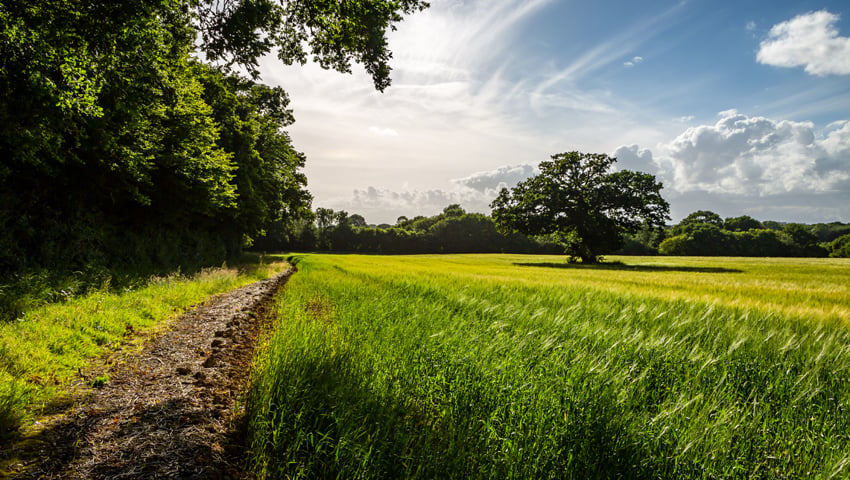New economic analysis demonstrates that the current agricultural budget is significantly less than what is required for the UK farm and land management sector to help tackle the nature and climate crisis.
The independent analysis – A Scale of Need – commissioned by RSPB, National Trust and The Wildlife Trusts, finds that increasing investment in nature-friendly farming to £5.9bn per annum across the UK is essential to meet legally binding nature and climate targets, and improve the resilience of the UK farming industry.
The current annual agricultural budget is £3.5 billion – which remains unchanged since 2013 – and approximately 20-25% is currently spent on agri-environment schemes that benefit nature.
Building on previous analyses the updated report gives the most accurate assessment to date of the level of widespread investment required. The new figures include, for the first time, analysis of different farm types across the UK and the variable costs of nature restoration across different sectors and sizes of farms.
RSPB, National Trust and The Wildlife Trusts are now calling on the new UK Government to increase the overall agricultural budget, and for the UK and devolved governments to then increase investment in nature-friendly farming. This will also pave the way for private finance to further bolster the budget.
The charities are also insisting that environmental schemes supporting nature and climate friendly farming must be delivered at sufficient scale to meet the challenges ahead.
Furthermore, the charities say that that for every pound of public money spent on nature restoration, the return will be at least three times that investment.
Beccy Speight, chief executive of RSPB, Craig Bennett of The Wildlife Trusts and Hilary McGrady, Director-General of the National Trust said, “Climate change and nature loss are the two biggest threats to UK food security and we are already seeing their impacts on food production, including the impact of the incredibly wet year to date. We are urging the new UK Government and devolved governments to urgently rise to this challenge with more ambitious funding models for nature-friendly farming. Farmers must be rewarded for helping nature to recover and tackling climate change, as well as producing food. These issues are deeply interlinked.
“Investing in nature restoration is a necessary, long-term strategy that will help to future proof UK farming, while also mitigating against the wider impacts of climate change. Restoring habitats can help protect communities from flooding. Protecting soils on farms helps to reduce run-off and clean up rivers. Landscapes full of wildlife lift our spirits and promote wellbeing, while also underpinning food production. The huge return on increasing investment in nature-friendly farming must be realised, and fast.”
With 70% of the UK farmed, farmers have a crucial role in nature recovery. From providing flower rich field margins, to planting native broadleaf woodlands and reducing chemical use, there is widespread ambition in the industry to provide “nature security” alongside “food security”, not least as nature underpins our ability to produce food in the UK and globally.
Across the UK, farmers are already experiencing the worsening impacts of the nature and climate crisis, with drought and flooding significantly impacting UK food production.
Martin Lines, CEO of the Nature Friendly Farming Network (NFFN), said, “This report should be a wake-up call for decision-makers across the UK and drive a step-change in investment for farming and land management.
“Tackling the climate and biodiversity crisis is not just important in its own right; it is crucial for farm business viability and UK food security. We have already seen the impact a wet winter and widespread flooding has had this year, and we know we can expect much more weather-related volatility in the future. Our ability to grow plentiful food long-term depends on improved soil health and water quality, increased resilience to flooding and drought and nature thriving on farms. Paying for this is not a negative cost to society, but a vital investment to secure our long-term food production capacity.
“As the new government starts work in Westminster, we need to see increased ambition for the UK’s farming budget and rapid scheme progress in England so the farming community can swiftly transition to nature-friendly farming at the scale required.”
While increased public funding is critical, more also needs to be done to unlock private investment in environmentally friendly farming.
Other compelling evidence demonstrating a similar need for further investment includes the UK Government’s own 2021 Food Security Report which identified climate change and biodiversity loss as the greatest threats to UK food security, and so any delay to providing the level of investment needed will result in higher costs in the future as problems like these across the agricultural sector continue to grow. Instead, the kinds of nature-based solutions that this investment could support can not only help provide resilience against these climate impacts, but also provide benefits to farmers such as pollination and natural pest control – reducing the need for expensive chemicals.
The findings of this latest Scale of Need report also follow on from the evidence presented earlier this year by the Green Finance Institute that ongoing nature degradation could cause a 12% loss to UK GDP.
As one of the two biggest drivers of nature loss in the UK, the intensive way in which we manage our land is already being left behind by some farmers and land managers across the UK in favour of more nature-friendly and sustainable approaches. Incentivising others to take this approach will be crucial if we are to meet our legally binding nature and climate targets and secure our long term food security.
